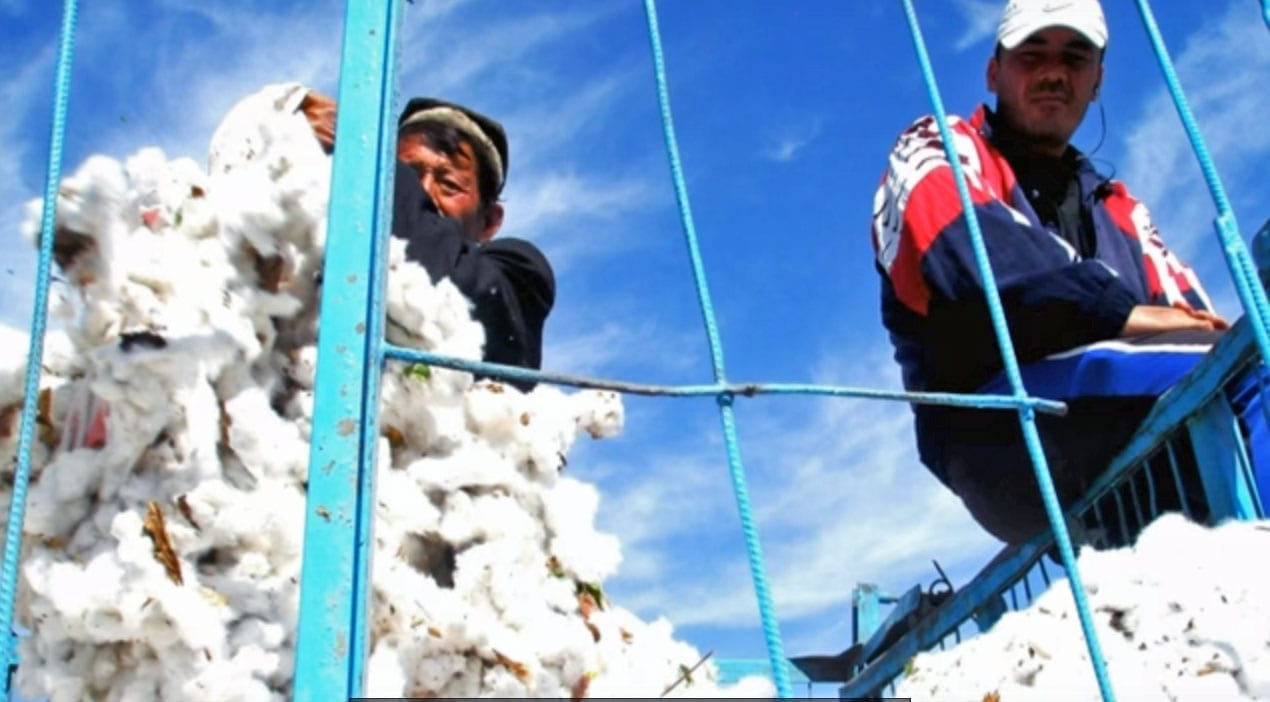
Aug 1, 2016
The World Bank must convey to the Uzbek government that attacks against independent monitors assessing the extent of forced labor in the country’s cotton harvest will not be tolerated. The World Bank must also outline consequences should the attacks continue, according to the Cotton Campaign.
In a July 29 letter to key World Bank officials, the Cotton Campaign, a coalition of dozens of labor and human rights groups that includes the Solidarity Center, wrote:
“The World Bank should take all reasonable measures to create an enabling environment for independent actors to monitor projects that it finances. We have not seen the bank take such measures in Uzbekistan.”
The World Bank Group is providing more than $500 million in financing to the government of Uzbekistan for its agriculture sector and additional financing to multinational companies processing forced-labor cotton in Uzbekistan.
1 Million in Forced Labor During Cotton Harvests
During each fall cotton harvest, the Uzbekistan government forces more than 1 million teachers, nurses and others to pick cotton for weeks, deeply cutting services at schools and medical facilities. Last fall, the government went to extreme measures—including jailing and physically abusing those independently monitoring the process—to cover up its actions.
“The Uzbek government’s repression of human rights monitors has made it impossible for essential mitigation measures of monitoring and grievance redress to function,” according to the coalition, which sent the letter in advance of an early August roundtable meeting of the World Bank, the Uzbek government, the International Labor Organization and diplomatic missions in Uzbekistan.
The coalition also is requesting that the World Bank “obtain an enforceable commitment from the Uzbek government to allow independent journalists, organizations and individuals to have access to all World Bank project-affected areas and to monitor, document and report about forced labor without interference or fear of reprisal.”
Uzbekistan Downgraded in US Trafficking in Persons Report
In June, an Uzbek victim of forced labor in cotton production and three human rights defenders filed a complaint against the World Bank’s private lending arm, the International Finance Corporation (IFC). They seek an investigation into forced labor connected to a $40 million loan to Indorama Kokand Textile, which operates in Uzbekistan. The complaint presents evidence that the loan to expand the company’s cotton manufacturing facilities in Uzbekistan allows it to profit from forced labor and sell illicit goods.
Also in June, Uzbekistan and Turkmenistan, where forced labor in cotton harvests also is rampant, were downgraded to the lowest ranking in the U.S. State Department’s 2016 Trafficking in Persons Report.
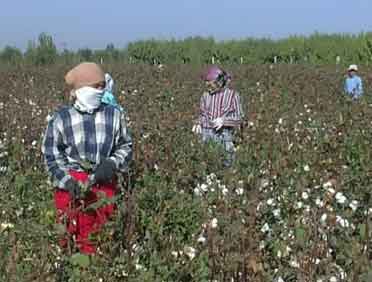
Jul 8, 2016
An Uzbek victim of forced labor in cotton production and three human rights defenders filed a complaint against the World Bank’s private lending arm, the International Finance Corporation (IFC), according to a coalition of human rights groups.
The June 30 complaint seeks an investigation into forced labor connected to a $40 million loan to Indorama Kokand Textile, which operates in Uzbekistan. The forced labor victim, who requested confidentiality, and the rights defenders Dmitry Tikhonov, Elena Urlaeva and a third who requested confidentiality, presented evidence that the loan to expand the company’s cotton manufacturing facilities in Uzbekistan allows it to profit from forced labor and sell illicit goods.
“The IFC should support sustainable rural development in Uzbekistan, not projects that perpetuate the government’s forced-labor system for cotton production,” says Tikhonov, who lives is in exile in France following possible retaliation—including the burning of his home—for his efforts to document forced labor in Uzbekistan.
“The ombudsman should investigate the IFC loan to Indorama, which we believe violates international law and the IFC’s own policies prohibiting forced labor.” The Cotton Campaign, the Uzbek-German Forum for Human Rights, the International Labor Rights Forum, and Human Rights Watch jointly announced the complaint.
1 Million in Forced Labor Each Year
Each year, the Uzbek government, which controls all of the country’s cotton production and sales, forces more than 1 million teachers, nurses and others to pick cotton for weeks. Last year, the government went to extreme measures—including jailing and physically abusing researchers independently monitoring the process—to cover up its actions.
Uzbekistan was downgraded to the lowest ranking in the U.S. State Department’s annual Trafficking in Persons report which was released last month.
The World Bank has invested more than $500 million in Uzbekistan’s agricultural sector. Following a complaint from Uzbek civil society, the bank attached loan covenants stipulating that the loans could be stopped and subject to repayment if forced or child labor was detected in project areas by monitors from the International Labor Organization (ILO), contracted by the World Bank to carry out labor monitoring during the harvest.
The World Bank approved the loan to Indorama in December 2015, despite an ILO report reaffirming the problem of forced labor.
In March, Cotton Campaign, a coalition of labor and human rights groups that includes the Solidarity Center, presented a petition signed by more than 140,000 people from around the world to World Bank President Dr. Jim Yong Kim, calling on the bank to suspend lending to the agriculture sector in Uzbekistan until the Uzbek government changes its policy of forced labor in the cotton industry.
Read the complaint here.

Jun 30, 2016
Uzbekistan and Turkmenistan, two countries where forced labor in cotton harvests is rampant, have been downgraded to the lowest ranking in the U.S. State Department’s 2016 Trafficking in Persons Report released this morning. The report also downgraded Myanmar (Burma) but boosted the ranking of Thailand, which a coalition of labor and human rights groups says has not meaningfully addressed human trafficking and should not have been upgraded.
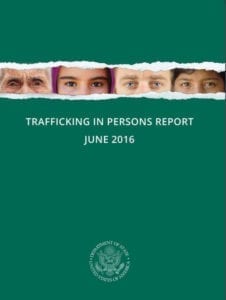 The report, which ranks countries based on their efforts to fight forced labor and human trafficking, downgraded Myanmar, Uzbekistan and Turkmenistan to the lowest level (Tier 3), meaning their governments do not comply with minimum U.S. Trafficking Victims and Protection Act (TVPA) standards and are not making significant efforts to become compliant.
The report, which ranks countries based on their efforts to fight forced labor and human trafficking, downgraded Myanmar, Uzbekistan and Turkmenistan to the lowest level (Tier 3), meaning their governments do not comply with minimum U.S. Trafficking Victims and Protection Act (TVPA) standards and are not making significant efforts to become compliant.
Each year, the Uzbek government forces more than 1 million teachers, nurses and others to pick cotton for weeks during last fall’s harvest. Last year, the government went to extreme measures—including jailing and physically abusing researchers independently monitoring the process—to cover up its actions.
In 2015, the State Department boosted Uzbekistan from Tier 3 to the “Tier 2 Watchlist,” saying the country was making efforts to become compliant with the TVPA, a move rejected by human rights activists who each year risk their lives to document widespread forced labor during cotton harvests.
Thailand Should Not Be Upgraded
Moving Thailand from the report’s lowest ranking is not warranted, according to a 13-member coalition, the Alliance to End Slavery and Trafficking (ATEST), which includes the Solidarity Center.
“Thailand’s lack of policy implementation and meaningful change on the ground calls for the lowest Tier 3 ranking,” says Kristen Abrams, ATEST acting director.
In June 2014, the State Department downgraded Thailand to the lowest ranking, due to reports of migrant workers, primarily from Burma and Cambodia, working in slave-like conditions on Thai fishing boats, fueling the country’s $7.3 billion seafood export industry and making it the world’s third-largest exporter. Today, many migrant workers still toil in forced labor and are held against their will on the boats where they are beaten and even killed. Thailand’s estimated 3 million migrants make up 10 percent of its workforce, but in seafood processing the make up 90 percent.
In releasing the report, U.S. Secretary of State John Kerry highlighted the plight of domestic workers, many of whom are working in countries far from their homes and are especially vulnerable to exploitation and abuse. Kerry announced the creation of a model contract for domestic workers based on international standards and a memorandum of understanding for origin and destination countries that sets clear standards designed to prevent the abuses of domestic work.
‘Malaysia Has Done Little to Address Trafficking’
This year’s report also fails to fix last year’s controversial upgrade of Malaysia, according to the coalition.
“More than a year after the discovery of mass graves of trafficking victims along the Malaysia-Thailand border, there is little evidence that Malaysia has taken anything more than meager steps to address its troublesome human trafficking situation,” Abrams says.
Among the 27 countries on Tier 3, the lowest ranking, are Algeria, Burundi, Haiti, Russia, Venezuela and Zimbabwe.
Profits from forced labor account for $150 billion per year, according to the International Labor Organization (ILO).
The report organizes countries into tiers based on trafficking records: Tier 1 for nations that meet minimum U.S. standards; Tier 2 for those making significant efforts to meet those standards; Tier 2 “Watch List” for those that deserve special scrutiny; and Tier 3 for countries that are not making significant efforts.
The Trafficking in Persons report, which has been issued annually for 16 years, covers 188 countries and is required by the 2000 TVPA law.
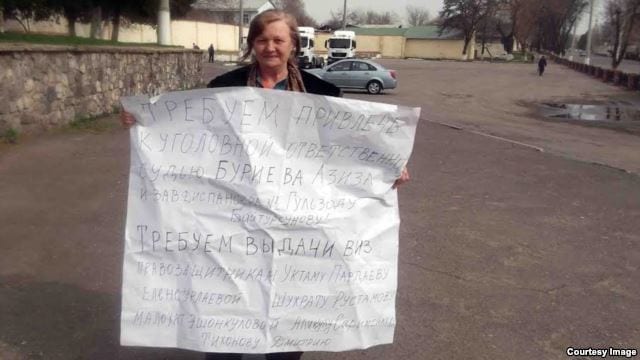
Jun 6, 2016
Uzbek human rights defender Elena Urlaeva was released last week from a psychiatric hospital in Tashkent where she was detained against her will for more than a month, according to the Cotton Campaign, a coalition of worker rights and human rights groups that includes the Solidarity Center.
While expressing relief at Urlaeva’s release, Umida Niyazova, director of the Uzbek-German Human Rights Forum says, “We continue to be alarmed at the heightened repression campaign the Uzbek government is carrying out against those who monitor forced labor in the cotton harvest.”
For 16 years, Urlaeva has documented forced labor in Uzbekistan’s cotton fields, where some 1 million teachers, medical professionals and others are forced to toil during harvest seasons. She has been credited with helping significantly reduce child labor in cotton fields, and this year was among human rights defenders in Uzbekistan to receive the International Labor Rights Forum 2016 Labor Rights Defenders Award.
Urlaeva was arrested five times last year as she spoke with those forced by the government to labor in the country’s cotton fields, and says that she was physically assaulted during the subsequent interrogation.
Uzbek Government Crackdown on Human Rights Activists
The International Labor Organization (ILO) has pushed the Uzbek government to end forced labor. Following a complaint by Uzbek civil society, the World Bank attached covenants stipulating its loans to Uzbekistan could be stopped and subject to repayment if forced or child labor was detected in project areas by ILO monitors contracted by the World Bank to carry out labor monitoring during the harvest. In March, members of the Cotton Campaign urged the World Bank to make good on its promise.
The Uzbek government has responded to global pressure to end forced labor by cracking down on Uzbek labor rights activists who monitor cotton harvests.
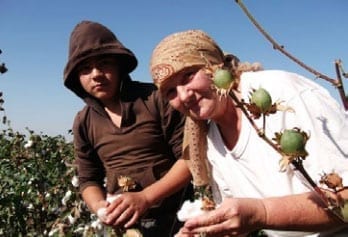
May 20, 2016
Uzbek human rights defender Elena Urlaeva has been detained against her will in a psychiatric hospital in Tashkent and the government should release her immediately, the Cotton Campaign said today. The Cotton Campaign is a coalition of worker rights and human rights groups that includes the Solidarity Center.
“Holding Elena Urlaeva in a psychiatric hospital without a clear medical rationale is a grave breach of medical ethics,” says Umida Niyazova, director of the Uzbek-German Forum for Human Rights (UGF). “She should be released immediately, and the Uzbek government must cease using hospitals as extrajudicial detention centers.”
Urlaeva’s Efforts Key to Reducing Child Labor
Urlaeva for years has documented forced labor in Uzbekistan’s cotton fields, where some 1 million teachers, medical professionals and others are forced to toil during harvest seasons. She has been credited with helping significantly reduce child labor in cotton fields, and this month was among human rights defenders in Uzbekistan to receive the International Labor Rights Forum 2016 Labor Rights Defenders Award.
Urlaeva was detained last year after interviewing and photographing teachers forced by government officials to work in the cotton fields, and says that she was physically assaulted during the subsequent interrogation.
The International Labor Organization (ILO) has pushed the Uzbek government to end forced labor. Following a complaint by Uzbek civil society, the World Bank attached covenants stipulating its loans to Uzbekistan could be stopped and subject to repayment if forced or child labor was detected in project areas by ILO monitors contracted by the World Bank to carry out labor monitoring during the harvest. In March, members of the Cotton Campaign urged the World Bank to make good on its promise.
Uzbek Government Targets Human Rights Defenders
The Uzbek government has responded to global pressure to end forced labor by cracking down on Uzbek labor rights activists who monitor cotton harvests.
Uktam Pardaev, another Uzbek labor rights activist was jailed while he was monitoring last fall’s cotton harvest in Uzbekistan and now is serving three years’ probation at his home, where he is under constant surveillance by security services. (You can take action to help Pardaev.)
Also last fall, Uzbek human rights defender Dimitry Tikhonov reported that his home office was burned and all the equipment and documentation he collected on Uzbekistan’s use of forced labor in the country’s cotton harvestsm destroyed. No other room in his home was touched by the fire, he said. Tikhonov also was arrested and beaten by police as he took photos of some 20 busloads of teachers and school employees forced into the cotton fields for the annual harvest. Tikhonov has since fled the country.
The stories of all three Uzbek human rights defenders are featured in a video created as part of the Labor Rights Defenders Award ceremony, in which a voice-over points out that “the Uzbek government treats them as enemies of the state because of their peaceful human rights activities.”



 The report, which ranks countries based on their efforts to fight forced labor and human trafficking, downgraded Myanmar, Uzbekistan and Turkmenistan to the lowest level (Tier 3),
The report, which ranks countries based on their efforts to fight forced labor and human trafficking, downgraded Myanmar, Uzbekistan and Turkmenistan to the lowest level (Tier 3),
